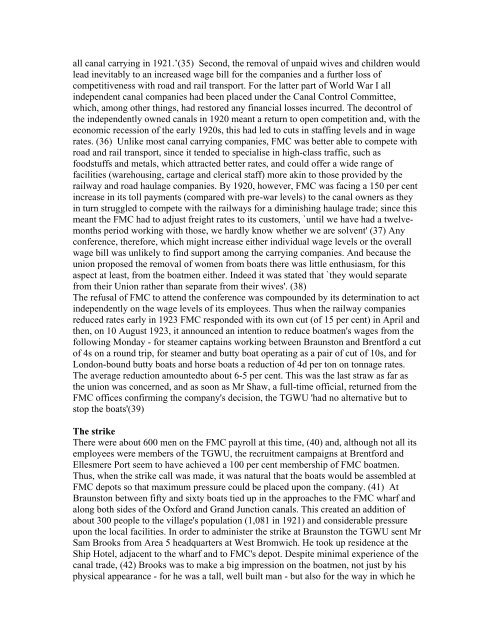The canal boatmen's strike of 1923 - The History of The Narrow Boat ...
The canal boatmen's strike of 1923 - The History of The Narrow Boat ...
The canal boatmen's strike of 1923 - The History of The Narrow Boat ...
Create successful ePaper yourself
Turn your PDF publications into a flip-book with our unique Google optimized e-Paper software.
all <strong>canal</strong> carrying in 1921.’(35) Second, the removal <strong>of</strong> unpaid wives and children would<br />
lead inevitably to an increased wage bill for the companies and a further loss <strong>of</strong><br />
competitiveness with road and rail transport. For the latter part <strong>of</strong> World War I all<br />
independent <strong>canal</strong> companies had been placed under the Canal Control Committee,<br />
which, among other things, had restored any financial losses incurred. <strong>The</strong> decontrol <strong>of</strong><br />
the independently owned <strong>canal</strong>s in 1920 meant a return to open competition and, with the<br />
economic recession <strong>of</strong> the early 1920s, this had led to cuts in staffing levels and in wage<br />
rates. (36) Unlike most <strong>canal</strong> carrying companies, FMC was better able to compete with<br />
road and rail transport, since it tended to specialise in high-class traffic, such as<br />
foodstuffs and metals, which attracted better rates, and could <strong>of</strong>fer a wide range <strong>of</strong><br />
facilities (warehousing, cartage and clerical staff) more akin to those provided by the<br />
railway and road haulage companies. By 1920, however, FMC was facing a 150 per cent<br />
increase in its toll payments (compared with pre-war levels) to the <strong>canal</strong> owners as they<br />
in turn struggled to compete with the railways for a diminishing haulage trade; since this<br />
meant the FMC had to adjust freight rates to its customers, `until we have had a twelvemonths<br />
period working with those, we hardly know whether we are solvent' (37) Any<br />
conference, therefore, which might increase either individual wage levels or the overall<br />
wage bill was unlikely to find support among the carrying companies. And because the<br />
union proposed the removal <strong>of</strong> women from boats there was little enthusiasm, for this<br />
aspect at least, from the boatmen either. Indeed it was stated that `they would separate<br />
from their Union rather than separate from their wives'. (38)<br />
<strong>The</strong> refusal <strong>of</strong> FMC to attend the conference was compounded by its determination to act<br />
independently on the wage levels <strong>of</strong> its employees. Thus when the railway companies<br />
reduced rates early in <strong>1923</strong> FMC responded with its own cut (<strong>of</strong> 15 per cent) in April and<br />
then, on 10 August <strong>1923</strong>, it announced an intention to reduce <strong>boatmen's</strong> wages from the<br />
following Monday - for steamer captains working between Braunston and Brentford a cut<br />
<strong>of</strong> 4s on a round trip, for steamer and butty boat operating as a pair <strong>of</strong> cut <strong>of</strong> 10s, and for<br />
London-bound butty boats and horse boats a reduction <strong>of</strong> 4d per ton on tonnage rates.<br />
<strong>The</strong> average reduction amountedto about 6-5 per cent. This was the last straw as far as<br />
the union was concerned, and as soon as Mr Shaw, a full-time <strong>of</strong>ficial, returned from the<br />
FMC <strong>of</strong>fices confirming the company's decision, the TGWU 'had no alternative but to<br />
stop the boats'(39)<br />
<strong>The</strong> <strong>strike</strong><br />
<strong>The</strong>re were about 600 men on the FMC payroll at this time, (40) and, although not all its<br />
employees were members <strong>of</strong> the TGWU, the recruitment campaigns at Brentford and<br />
Ellesmere Port seem to have achieved a 100 per cent membership <strong>of</strong> FMC boatmen.<br />
Thus, when the <strong>strike</strong> call was made, it was natural that the boats would be assembled at<br />
FMC depots so that maximum pressure could be placed upon the company. (41) At<br />
Braunston between fifty and sixty boats tied up in the approaches to the FMC wharf and<br />
along both sides <strong>of</strong> the Oxford and Grand Junction <strong>canal</strong>s. This created an addition <strong>of</strong><br />
about 300 people to the village's population (1,081 in 1921) and considerable pressure<br />
upon the local facilities. In order to administer the <strong>strike</strong> at Braunston the TGWU sent Mr<br />
Sam Brooks from Area 5 headquarters at West Bromwich. He took up residence at the<br />
Ship Hotel, adjacent to the wharf and to FMC's depot. Despite minimal experience <strong>of</strong> the<br />
<strong>canal</strong> trade, (42) Brooks was to make a big impression on the boatmen, not just by his<br />
physical appearance - for he was a tall, well built man - but also for the way in which he


